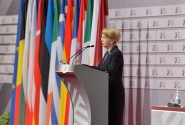
On Thursday, 5 March, Ināra Mūrniece, Speaker of the Saeima, at the opening of a high-level foreign policy and defence conference emphasised: “Europe has sobered up during the last year. Over a relatively short period, the international society realised that some international agreements are actually ineffective, as was the case with the Budapest Memorandum on Security Assurances signed in 1994, which, among other issues, stipulates Ukraine’s territorial integrity. The sanctity of its borders is violated. The values are challenged”.
The Interparliamentary Conference for the Common Foreign and Security Policy and the Common Security and Defence Policy held in Riga on 5–6 March is one of the six interparliamentary events organised by the Saeima within the framework of the parliamentary dimension of the Latvian Presidency of the Council of the EU.
In her address, Speaker Mūrniece emphasised that security and defence issues have never been simple for Europe, and their significance has increased as a result of harsh and unexpected events. “Europe started to question its solutions, its attitudes, its ability to react in a timely manner and to take the right remedies. The rapid, unpredictable and embarrassing geopolitical developments can be observed in Latvia’s neighbourhood.”
There are politicians who believe that peace can be achieved and wealth, financial gain and comfort can be preserved by satisfying the aggressor’s growing demands, said the Speaker with concern. In this context, she recalled the Munich Agreement of 1938, when international partners believed that they were ensuring peace by permitting the annexation of a part of Czechoslovakia. That peace did not last, and it resulted in a major pan–European war. Ināra Mūrniece stressed that the lessons of the past should not be forgotten.
Concurrently, the Speaker of the Saeima acknowledged that the situation today is even more complex than the one in 1938. “We in the Baltics, have a neighbour who constantly reminds us of its nuclear potential. Russia’s possession of nuclear power is combined with the growing wave of hatred that resulted in an appalling political murder last week,” said Ināra Mūrniece. She emphasised that “even under the current circumstances we should not stop seeking solutions and, regardless of a certain confusion in Europe, I dare to say that Europe has not lost its eagerness to look for solutions, and I truly believe that they will be found”.
In her address to the audience, Speaker Mūrniece strongly condemned the hybrid warfare launched by Russia in the eastern regions of Ukraine, which inter alia contain elements of information warfare. “We have realised that security threats are no longer only of a military nature; therefore, we have to develop our capability to resist these hybrid threats,” emphasised the Speaker. She also confirmed that Europe and its neighbourhood are systematically influenced, challenged and undermined by disinformation campaigns. Latvia supports a timely and speedy development of a common EU communication strategy which would enable it to effectively counter disinformation campaigns carried out in such an information war. Concurrently, Ināra Mūrniece emphasised that we have to follow closely whether the agreement reached in Minsk leads to the de-escalation of the crisis in Ukraine and serves as a basis for a sustainable solution regarding Ukraine’s independence, sovereignty and territorial integrity.
A live stream of the meeting is available on the website of the Parliamentary Dimension of the Latvian Presidency at http://parleu2015.lv/en For the programme of the meeting, please visit http://www.parleu2015.lv/files/cfsp-csdp/programme_cfsp_en-2.pdf
Saeima Press Service







